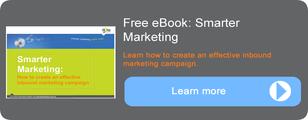Here is a short summary slideshare presentation on the results of a very large survey of marketers carried out by Hubspot. It provides a treasure chest of great data for marketers and particularly managers seeking to build support withing the management team.
This is the fifth edition of The 2013 State of Inbound Marketing Report. Hubspot asked 3,339 marketing professionals from 128 countries to share their perspectives on everything from strategy and organisational alignment to budget and channel management. This is a robust data set and provides some revealing insights into the state of marketing in organisations.
The top 7 key findings from the survey
1. Inbound marketing is being taken seriously and it’s gaining traction.
58% of companies plan to execute inbound marketing strategies in 2013, and 48% of marketers plan to increase their inbound marketing spend this year.
2. Inbound delivers on ROI promises, providing more and cheaper leads.
41% of marketers confirmed that inbound marketing produces measurable ROI, and a staggering 82% of marketers who blog see positive ROI for their inbound marketing (tweet this). Twice as many marketers say inbound marketing delivers below average cost per lead versus outbound strategies, and inbound marketing is estimated to deliver 54% more leads into the marketing funnel than traditional outbound methods.
3. Marketers must better define, measure, and track activities.
While 15% of respondents were tying their inbound results directly to revenue or customers/wins generated, a surprising 34% of businesses cannot or do not calculate overall inbound ROI.
4. Establishing an agreement with Sales is as important, possibly more so, as simply measuring the effectiveness of inbound.
Adopting a Marketing-Sales agreement saves companies (with more than 200 employees) an average of $195.84 per customer. So closer alignment between marketing and sales shows proven results.
5. Content is a critical, but not standalone, inbound marketing component.
Content alone does not transform your marketing. Only 18% of marketers are purely focused on developing quality content in 2013. Finding and converting quality leads and identifying the right audience ranked more important than developing content in terms of marketers’ overall priorities, showing that a more holistic inbound strategy is the path to success.
6. It’s a great time to be a customer.
50% of the 2013 survey respondents said that they consider their companies to be primarily customer-focused. As inbound marketing focuses on customer needs and behaviors, the approach clearly aligns with the customer-centric approach. This customer-centric strategy ensures integration across platforms, so the sum of marketing efforts is greater than its individual parts.
7. Overall, inbound marketing works when it is integrated with your strategy, not as a side project.
81% of companies reported some level of integration between their inbound marketing strategies and overall company goals. Marketers that succeed with inbound marketing dedicate a high level of time, commitment, and resources to getting it right. Inbound marketing is not a quick-fix. Successful inbound execution requires a strategic change in how you focus your end-to-end marketing practices, such as building and staying true to your core customer personas and relentlessly tracking your lead generation goals.
One of the most important findings from the research is that marketers must build an integrated approach to your marketing, that blends your website, content and inbound marketing in a way thats aligned with sales. If you would like to read more, we have a free eBook on how to do this. Please feel free to download it.

